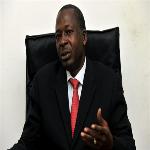21 October 2010

Photo: AFP
The new president of the electoral committee in Guinea Malian General Siaka Toumany Sangare poses for a photograph in Conakry 20 Oct 2010
The new head of Guinea's electoral commission starts work Thursday. His first job is deciding whether the country can hold presidential elections on Sunday.
General Siaka Toumany Sangare meets with members of the independent national electoral commission, including its former chief Louceny Camara, who now serves as a deputy chairperson, alongside Hadja Mame Camara, as part of a political compromise.
It is not an entirely new situation for Sangare, who is an election specialist with the International Organization of the Francophonie and was already a technical assistant to the commission.
But it is one thing to be an outside advisor and quite another thing for the Malian to sit atop Guinea's much-contested electoral commission, three days before a scheduled presidential run-off between former Prime Minister Cellou Diallo and long-time opposition leader Alpha Conde.
Sangare says he is grateful for the trust placed in him by Guinea's interim military leader General Sekouba Konate.
He says, with the help of his colleagues on the electoral commission as well as other officials involved in this process and the two candidates, he can steer the ship of the second round into a safe harbor, God willing.
But Sangare says he will not know until later Thursday if the second-round runoff can take place Sunday, as scheduled. Sangare will also meet with Diallo and Conde and is urging both candidates to leave their animosity in the past.
Violence last month between Diallo and Conde supporters postponed a second-round vote that had already been delayed by legal challenges to the results of June's first round, in which Diallo won 44 percent of the vote and Conde finished second with 18 percent.
General Konate is trying to return Guinea to civilian rule, nearly two years after soldiers took power in a military coup following the death of long-time leader Lansana Conte.